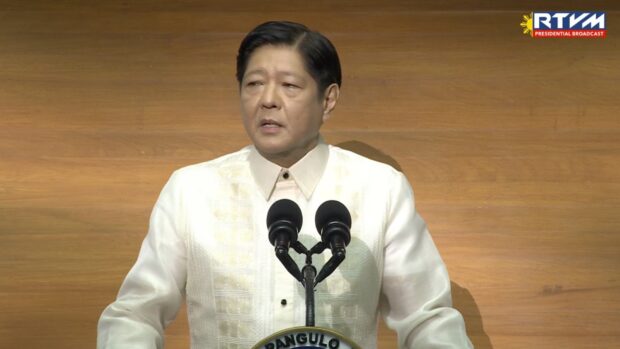
Screenshot from RTVM
MANILA, Philippines —President Ferdinand Marcos Jr., in his second State of the Nation Address (SONA) on Monday, touted the country’s robust economic growth, citing a gross domestic product (GDP) growth rate of 7.6 percent in 2022, the highest in 46 years.
Marcos emphasized the resilience of the Philippine economy, stating that despite global headwinds due to the COVID-19 pandemic and other crises, the nation managed to thrive and remain among the fastest-growing economies in Asia and globally.
The President pointed to the nation’s financial system as the cornerstone of economic growth, saying “banks, the transmission arms of our monetary policy, have strong capital and liquidity positions.”
The digital economy, he added, played a pivotal role in this recovery, contributing P2 trillion, or 9.4 percent of GDP, in 2022. According to Marcos, this reflects the revival and rejuvenation of the economy, bolstered by an enabling environment and the strong rule of law.
For 2023, the World Bank is projecting the Philippine economy to grow by 6 percent, well within the government’s growth target range of 6 to 7 percent. This is driven primarily by strong local demand, an expanding BPO industry, steady flow of remittances, and steady recovery of jobs.
Inflation, which began the year at 8.7 percent, is showing signs of easing, with the rate down to 5.4 percent in June. The Bangko Sentral anticipates further easing to hit 2.9 percent by 2024.
“On matters of the economy, there are many things over which we have no control. But over those where we do have control, we are doing everything we can,” the President said, detailing government measures to stimulate the economy, including enhancing infrastructure support and boosting industry growth.
Investments in public infrastructure, food, education, health, jobs, and social protection continue to be prioritized, accounting for nearly 70 percent of the national budget.
Marcos also cited the increase in government revenue generation, particularly the record collections by the Bureau of Internal Revenue and the Bureau of Customs.
The President appealed to Congress for continued support of his administration’s policies and reforms under its fiscal framework. The government aims to increase tax and revenue efforts to up to 16.9 percent and 17.3 percent by 2028, respectively. This approach is expected to significantly bolster public investments in the coming years.


